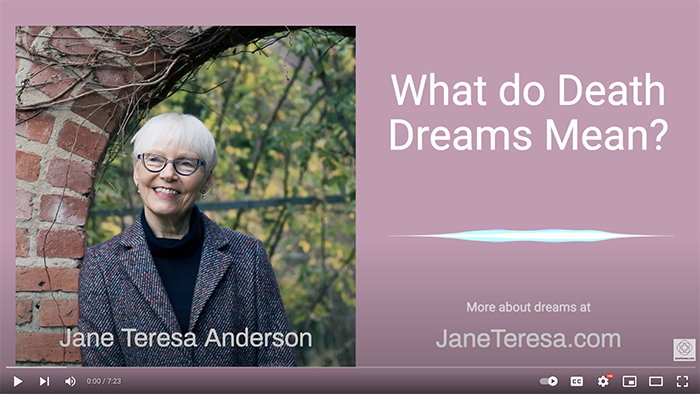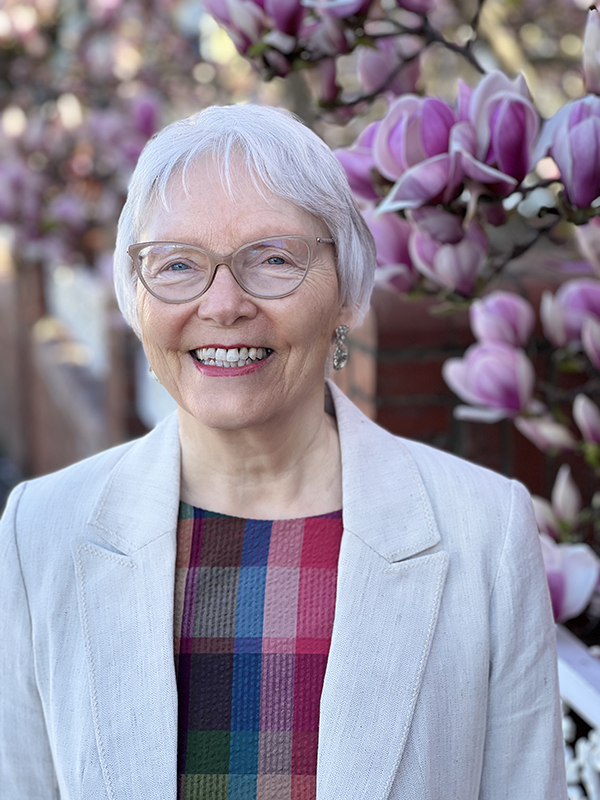Your death dreams are symbolic: they are not related to actual past, present or future deaths, but are extremely meaningful about your own past, present and future. Dreams about death – once analysed – help you to see your best way forward. So don’t worry that your dream has predicted a death: that’s not what these dreams are about. These dreams hold the key to life (not death) – when you understand them.
(This article is copyright Jane Teresa Anderson.)
Dreams of death, dying and the departed can be extremely scary dreams but, once understood, they can be most insightful and freeing. Dreams of death are perfectly normal and natural, even the horrific ones. They are also very common dreams although people are often too fearful to mention them.
This article starts by discussing dreams of death and dying and what they mean and then moves on to look at dreaming about departed loved ones. Finally I’ll discuss those dreams where you feel you are being haunted or visited by a spirit or presence.
Can dreams predict death?
Before all of this though there is one really important message to get across and it is this. When you dream of the death of someone you know – including yourself – it is natural to worry whether the dream is precognitive – that is, whether it is a glimpse of the future, foretelling death. I’m here to reassure you that your death dream is extremely unlikely to foretell anyone’s death. As a dream analyst I have discussed death dreams with thousands of people and 99.99% of those dreams were totally symbolic. It is true that some dreams do include details of the future, but these are rare. (Some people regularly dream of close friends and relatives at the moment of their passing, but this is rare, and even these dreams rarely give details of the actual deaths.) Death dreams are so common that if they were precognitive the human race would have become extinct long ago! If you think your death dream is precognitive you are missing a wonderful opportunity to open yourself to some new and amazing experiences in life, because this is what most death dreams are about: death of past ways of being to make way for new ways of being.
This is why:
Death as a symbol of something ending
We see death all around us: the death of the old year gives way to the birth of the new, the death of winter leaves pave the way for the birth of spring leaves, the death of a crumbling old building allows a new one to be built in its place, the death of a relationship that is no longer working for either partner eventually opens the way for you both to begin new relationships and so on. It is often the case that the new cannot be created until the old has ended. For things to change, old habits often need to die.
Death in dreams is symbolic of things that are coming to a close, or ending, in your life. These are usually necessary to clear the way for new things to come into your life. Death dreams are about change. For change to happen, we need to end old attitudes, old ways of being or old beliefs because otherwise these old ways are in the way of the new. How can you develop a new attitude if you are still clinging to the old?
The problem with death dreams is that they’re often so graphic, or they feature people you know and love which is emotionally devastating. It can be so hard to tear yourself away from the emotional impact of seeing someone you love die in a dream and to focus on the fact that the dream is about YOU – not about physical death, but about the death of old ways within you. Difficult, but it must be done if you are going to discover the huge personal rewards of understanding your dreams of death.
Worse still, of course, are those terrifying dreams where you kill someone. Again, you must focus on removing yourself from the emotional impact of the dream so that you can consider its symbolism and recognise its meaning and application to your life.
Okay, so the simple fact is that death dreams are about something in your life ending so that something new can begin. So, how can you work out what your dream is referring to and why do they have to be so graphic?
Death dreams are often graphic simply to grab your attention – and it works, doesn’t it? Death dreams tend to come up when it’s vitally important that you understand that an ending-beginning process is happening.
Sometimes we end things prematurely. For example, we might end a relationship that we could have healed, or drop out of a study course that would really have been good for us, or kill off a gift or talent by ignoring it. The last case is quite common: you might have a wonderful talent as an artist, for example, but be too fearful to develop your skills, choosing instead a well-paid but unhappy profession for yourself. In this example you might expect dreams where someone or something dies at a young age and you experience huge regret in your dream.
So, endings are not always appropriate. There is a time for every season and your dreams can help you to know when the time is right.
Imagine a dream where a friend, let’s call him Simon, dies. The first thing to ask is “What does Simon represent to me? What three words would I use to describe his approach to life?” You might decide, “Simon represents frivolity. He is frivolous, doesn’t care about tomorrow and is great fun to be with”. In that case your dream probably suggests that the frivolous part of yourself or your life is dying off or ending. You can then ask yourself if this is what you want. “Okay,” you might think, “I’m ready to be more serious about my relationship now and I do want to care about and plan for tomorrow so I can see why my dream might picture this feeling as Simon dying, but I do feel sad if this means I’ll also lose touch with the fun side of life.” So, knowing what your death dream is really about, you can then do a reality check. You can decide, with this new insight, whether you can find a way of keeping touch with the fun side while moving on to a more serious relationship and plans for new tomorrows, for example.
If it is an animal that dies in your dream, apply the same kind of questioning. For example, if a little rabbit dies in your dream and you are devastated, ask yourself what the rabbit represents to you, or what three words would describe the rabbit’s approach to life. You might decide the rabbit represents your childhood because you had a toy rabbit when you were small and so you might see your dream as marking yet another step in leaving your childhood behind. Or you might describe rabbits as “pests, too productive, eating all the food” in which case you might decide your dream was about ending an area of your life where you are over-productive and using up all the resources that should be nourishing you. What could this be? You might be a workaholic (over productive) missing out on nourishing yourself with rest and relaxation, for example.
So, you can see that death dreams cover both the positives and negatives of endings, but once you’ve worked out what the dying person or thing in your dream represents you can then decide on whether the ending it represents is timely or not.
When you see yourself dying or dead in a dream
And what about those dreams where it is YOU who is dying, or where you are told you are dying, or where you see a younger or older version of yourself dying, or where you see yourself dead in a coffin or at your own funeral? Again, take a deep breath and remind yourself that your dream is symbolic. These dreams tend to come up when huge areas of your life are changing, with the old you virtually unrecognisable to the new you who is emerging. Again the details of your unique dream help to identify exactly what is changing and this, in turn, helps you to decide whether these changes are to be welcomed or whether they are premature or not in your best interests.
When teens dream of killing a parent
It’s natural and common for teenagers and young adults to dream of killing one or both parents. This is devastating for the dreamer who harbours no ill feeling against his or her parents, which is more than often the case. What can be even more troubling to the dreamer is that the killing was done in cold blood in the dream, with no remorse. It’s as if killing the parent was a perfectly normal thing to do. The dream marks a healthy stage in the development of a teenager into an adult. As children we are heavily influenced by our parents, and part of the process of developing into an independent adult is to kill off some of the beliefs our parents have taught us. The dream is as simple as that. The parent in the dream represents the old authority. Some of the old authority’s beliefs are good and are carried on, but some need to be killed off within the dreamer’s inner world. He or she needs to be free to develop his or her own beliefs and to become his or her own authority. The influence of parents is so strong that this is the only way the dreaming mind can picture disposing of the old beliefs he or she had carried until now.
When you dream of a child’s death
If you dream of seeing a child’s coffin or you hear of a young child’s death in a dream, ask yourself how old you felt the child was. For example, if you felt the child was aged seven, then ask yourself what has been in your life for seven years and is now ending. Dreams are quite accurate with numbers but less literal in other areas. So a seven-year-old dead child may represent something that ended for you seven years ago, seven weeks ago, when you were in grade seven, or when you lived at house number seven. The other details in your dream, once interpreted, enable accuracy.
Extra clues: what is the cause of the dream death?
How are people dying in your dream? If you see someone suffocating, for example, ask yourself what seems to be suffocating and coming to an end in your life, or within you.
Dreams of the Departed
Let’s move on now to look at dreaming of departed loved ones.
It’s natural to want to dream about someone you love who has passed on and when those dreams are full of love and pleasure they can feel reassuring and healing. It’s as if the loved one is still around, giving support and extending love. On the other hand it’s just as common to dream of a departed loved one appearing in a dream in a frightening manner, usually angry, cruel or blaming you. That’s when you, the dreamer, can get really distressed, until you take a long deep breath and remind yourself that this dream is symbolic – the person is NOT visiting you in your dream: you are dreaming about your feelings of grief at losing him or her.
If you have experienced losing someone close, you are probably familiar with the stages of grieving. Early on it’s normal to feel angry with the person for dying and abandoning you. Irrational, yes, but normal. You may also feel that he or she was cruel in leaving you to live on without their support and you may even blame yourself for their death – perhaps feeling that you didn’t love them enough and so on. Again, quite irrational but normal. So, when the departed loved one appears in your dream as angry, cruel and blaming he or she is a symbol representing what you have lost and your feelings about it. Once you understand this, these dreams are healing, because they are your own feelings letting off steam safely in your dream. When you have this kind of dream reassure yourself that you are working through the normal stages of the grieving process and that you’re moving through healing towards a sense of peace.
What about those dreams of people who were difficult in waking life, those with whom relationship was tense? Often, after the person’s death, it’s common to have a reunion dream where the person is loving, kind and forgiving. What is happening in these dreams is that YOU are the one doing the forgiving and the loving – forgiving and loving the other person, and forgiving and loving yourself for having done the best you could do. Again it is a healing dream that leads you towards a sense of inner peace.
It’s quite common to dream of a deceased relative giving you a death date in a dream: obviously this is terrifying, but I’m here to assure you that the dream is symbolic. No-one in a dream can predict your death date. Here’s a longer article I have written about this.
People in your dreams symbolise something about you
Just as many of your dreams feature people you know who are still living, or who you knew in the past, they can also feature people who have passed on. A deceased relative may simply be featured in a dream to symbolise something about you in the same way as anyone else may feature in your dream to symbolise something about you. In other words, your dreaming brain picked them to suit a character part in your dream. They may symbolise an aspect of your personality, or a belief you share, or a conflict that remains unresolved, and that’s just for starters. Here’s an article to help you work out the symbolism of a particular person in a dream: Dreaming of people you know – a checklist
Dreams of being haunted or sensing a presence
Now let’s move on to those dreams where you feel you are being haunted by a spirit or where you dream of a presence (usually scary) or even feel that a presence is actually in your room. When you dream of being haunted by a spirit this usually means you are feeling haunted by something from your past. What kinds of things haunt you? Memories, guilt, regrets … thoughts of what could have been perhaps? Consider the spirit in your dream and ask yourself what he, she or it represents to you. For example, your dream spirit might be a starving prisoner so he might represent some way in which you have starved yourself emotionally that is still haunting you. Or your dream spirit might be an old sailor which, on reflection, you decide probably represents an adventurous spirit – your adventurous spirit that you have abandoned but that comes back to haunt you, reminding you of your regret. Having such a dream you might decide to enrol for something adventurous and, if you do, your dream spirit will probably disappear from your dreams since he no longer lives in the past because you have integrated him into your present.
Dreams of the devil or evil spirits
Your dream spirit might appear as the devil. This is common for people who have experienced a strict religious upbringing. What happens is that you push away all the things you feel guilty about – all the things your religion has informed you are bad – you push them so far away that they seem separate from yourself. You have disowned them so they appear as a separate being and what better symbolism, for such a dreamer, than to embody all that guilt in the form of the devil? Until you realise this, of course, this kind of dream is extremely scary because it’s easy to believe that the devil is really there judging your guilt, instead of being a dream symbol that your dreaming mind has chosen to represent your own harsh judgement of yourself. What can you do about this type of dream? The best approach is to realise that there is no devil haunting you other than your own feelings of misplaced guilt or judgement. Simply realising this is usually enough to stop the dream, but if you need reinforcement you may choose to have the details of your personal dream interpreted and have a Dream Alchemy Practice created for you.
An evil presence in the room: are you dreaming?
Finally let’s look at those dreams where you think you may, in fact, not be dreaming – those experiences where you feel an evil presence is in your room or hovering near you and your heart is pounding with intense fear and you can’t move or shout out. What do these dreams or experiences mean?
To start with, they are very similar to the spirit or devil dreams already discussed in that the presence is, in fact, your own feelings of harsh judgement against yourself. Anything that you consider bad or evil about yourself is bundled up and pushed away so that you are left feeling virtuous and good. But that pushed away negative energy always comes back to haunt you in your dreams simply because you need to confront it, to understand that you’ve dismissed some very genuine emotions and feelings instead of handling them and healing them.
Your dreams go for major impact and really drum up the evil feeling because that is exactly what you have done. For example, you might have been taught, as a child, that it is wrong to be angry with anyone or anything so you learned to push any anger away and remain a very nice calm person, a friend to everyone, loved by all. But in doing this you miss out on healing large areas of your life, because those angry feelings were a natural consequence of feeling hurt. You need to find safe ways to express your feelings of anger – ways that are not harmful to other people – so that you can go deeper and address those hurts that still need healing. So, in this example, that evil presence is all your anger that you have pushed away, still haunting you, always hovering nearby, needing to be faced and used in a healing way.
So these dreams are about integrating feelings and beliefs that you have pushed away. Once you’ve integrated these and owned them, you can transform them for your healing.
So why does this kind of dream sometimes feel as if it’s not a dream? Why is it that sometimes you really think you are awake and the presence is there?
Dreams such as these cause your body to go into fear response, so your body releases adrenalin, your heart beats faster, you break out in a cold sweat and – often – you freeze, unable to move. These are natural physiological responses to fright. Sometimes you even wake up partially, opening your eyes while your mind is still dreaming. At this point something really interesting happens. Because your eyes are open, images of your dark bedroom are arriving at your brain at the same time as your brain is also seeing your dream, so, rather confused, your brain comes to one conclusion: all of this must be taking place out there, in your room! So you see your dream presence apparently in your bedroom. Often this is enough to completely frighten you awake and that is when the presence disappears but the sweat lives on. You may still feel the freeze and be unable to shout out or move.
Even if you don’t open your eyes, a frightening dream can sometimes jump you out of your dream too fast while your physical body is still in safe sleeping mode. Think about it: when you fall asleep you have all those active dreams but your body is more or less still, apart from the odd twitch and your rapidly moving eyes under your eyelids. This is the body’s way of going into safe mode: your muscles are quietened so that you don’t get up and act out your dreams and hurt yourself. But when your mind wakes up before your body – such as in a very frightening dream – your physical body can’t shout or move because it is still in safe mode.
Every dream is unique and is all about you
Dreams of death and dreams of haunting are complex, but these basics should be enough to reassure you of their general meanings. Every dream is unique and it is the details in your dream that help pinpoint exactly which area of your life your dream is addressing. You may wish to move on and discuss your dream personally with me to discover its exact meaning so you can make appropriate decisions in your life based on this insight.
copyright, Jane Teresa Anderson
Need more help?
The Dream Academy online courses
Learn online at your own pace and in your own time, at The Dream Academy.
Begin with my online course, How to interpret your dreams step-by-step.
My courses include video instruction, written resources, quizzes, and much more.
Learn on your desktop or on your mobile devices as The Dream Academy is a wonderfully mobile-friendly site.
Profile photo credit: Michael Collins



